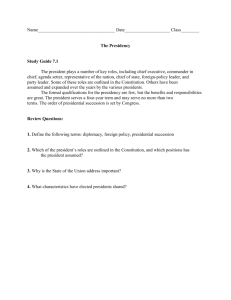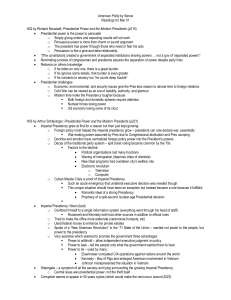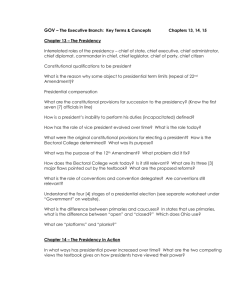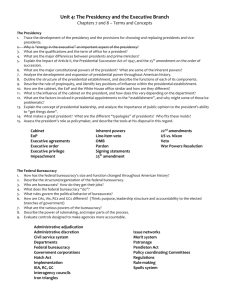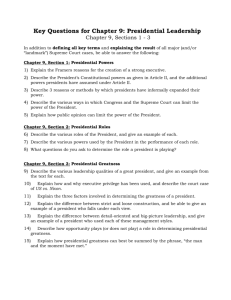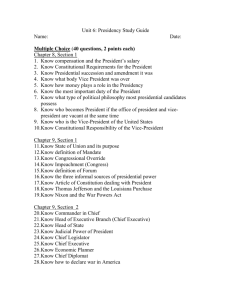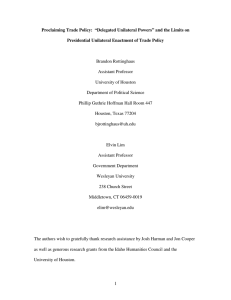President
advertisement
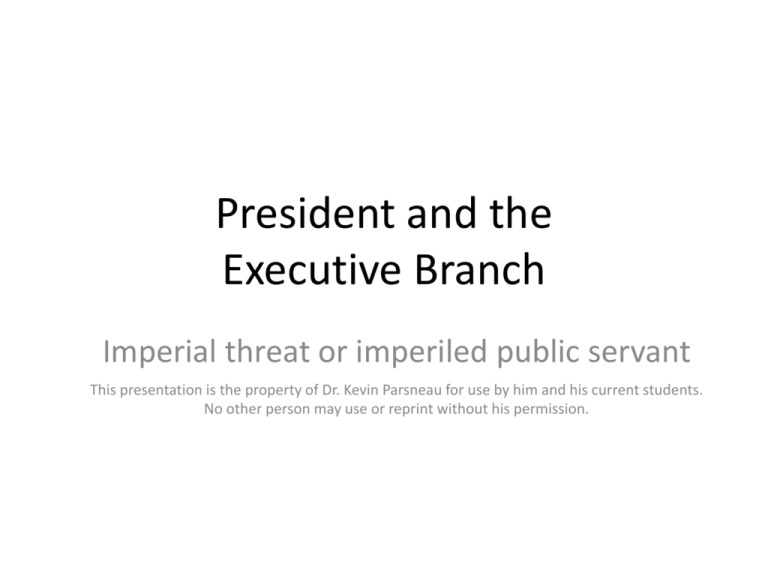
President and the Executive Branch Imperial threat or imperiled public servant This presentation is the property of Dr. Kevin Parsneau for use by him and his current students. No other person may use or reprint without his permission. Introduction to the Presidency • Presidents are frequently called “the most powerful man in the world.” What do we expect of presidents? • What are the President’s powers and can presidents live up to our expectations? • Why are some presidents more powerful than others? • Some of the framers of the Constitution were concerned that presidents would be too powerful, while others were concerned that presidents would not have enough power. Are modern presidents too powerful or not powerful enough? Presidential Power • What do we expect presidents to do? • What’s in the Constitution to get the job done? "I did not usurp power, but I did greatly broaden the use of executive power.“ —President Theodore Roosevelt Stewardship Theory of the President: Categories of Presidential Power • Expressed • Delegated powers • Inherent Powers Constitutional Powers of the President • • • • • • • Veto (legislative power) Commander in Chief of the Military Chief Executive Reprieves and pardons Treaties Appoint Federal Judges State of the Union Address Can “intent” to tell us presidential powers? • There was disagreement among the framers of the Constitution. – Madison and Jefferson disagreed with Hamilton and Washington – Hamilton disagreed with himself at different times • There may be no universal, best interpretation. • Presidential powers will be political defined by presidents in conflict with others. Roles of the President • • • • Head of State Head of Government Head of Party Chief Diplomat Other sources of presidential power • • • • • • • Persuasion and Bargaining Public Presidency Unilateral Actor Administrative Presidency Congressional Support Foreign Policy War Powers Richard Neustadt (1960) • Wield power through: – Command – Persuasion – Bargaining • Presidents have to rely on bargaining and building a professional reputation. Public Presidency • “Bully Pulpit” • Set the Public Agenda – Mandate – Honeymoon – Presidential Approval – Rally “Around the Flag” Effect Presidential Unilateral Action • Executive Orders • Executive Agreements President and Congress • Unified Government • Divided Government • Presidential Coattails Other sources of presidential power • • • • • • • Persuasion and Bargaining Public Presidency Unilateral Actor Administrative Presidency Congressional Support Foreign Policy War Powers War Powers Act (1973) • President may commit armed forces – Declaration of war – Specific statutory authorization – National emergency (attack on the U.S. , its territories, possessions or armed forces) • Must consult with Congress “at every possible instance” • 60-Day Clock for Reauthorization Final Comments on Presidential Power • Imperial of Imperiled Presidency? – Secrecy – Abuse – No checks and balances Final Comments on Presidential Power • Imperial of Imperiled Presidency? – Public Expectations – Vast Size and Complexity – Party decline and lower party discipline – Mass media and end of the “Golden Era” Does the President have too much power? • Have we moved away from “checks and balances”? • Is it good that the President is the center of attention and action? • Would it be better for it to be otherwise? • What is the alternative in the modern political environment?
